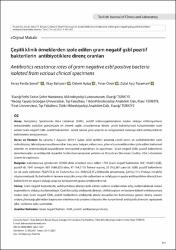Çeşitli klinik örneklerden izole edilen gram negatif gsbl pozitif bakterilerin antibiyotiklere direnç oranları
Citation
Şenol, F. F., Bahçeci, İ., Aytaç, Ö., Öner, P. & Aşcı Toraman, Z. (2021). Çeşitli klinik örneklerden izole edilen gram negatif gsbl pozitif bakterilerin antibiyotiklere direnç oranları. Turkish Journal of Clinics and Laboratory, 12(4), 451-457. https://doi.org/10.18663/tjcl.956156Abstract
Amaç: Genişlemiş Spektrumlu Beta Laktamaz (GSBL) pozitif mikroorganizmaların neden olduğu enfeksiyonların
tedavisindeki zorluklar günümüzde en önemli sağlık sorunlarından biridir. çeşitli bakteriyolojik kültürlerinden izole
edilen Gram negatif GSBL pozitif bakterilerin örnek türüne göre ampirik ve semptomatik tedaviye etkili antibiyotiklerin
belirlenmesi amaçlanmıştır.
Gereç ve Yöntem: Bu çalışma 1 Ağustos 2019-1 Şubat 2020 tarihleri arasında çeşitli servis ve polikliniklerden rutin
mikrobiyoloji laboratuvarına yollanan idrar, kan, yara, balgam, eklem sıvısı, plevral sıvı örneklerinden izole edilen bakteriyel
etkenler ve antimikrobiyal duyarlılıkların retrospektif araştırılması ile yapılmıştır. Gram negatif GSBL pozitif bakterilerin
tanımlanmaları ve antibiyotik duyarlılık testleri konvansiyonel yöntem ve MicroScan (Beckman Coultre, USA ) otomatize
sistem ile yapılmıştır.
Bulgular: Laboratuvara gönderilen 13,968 klinik örnekten izole edilen 1735 Gram negatif bakterinin 1041 (%60)’i GSBL
pozitif idi. 1041 örneğin; 901 (%86,55)’i idrar, 47 (%4,51)’si Trakeal aspirat, 35 (%3,36)’i yara idi. GSBL pozitif bakterilerin
en sık izole edilenleri 732(%70,3) ile Escherichia coli, 249(%23,9)’u Klebsiella pneumonia, 22(%2,11)’si Proteus mirabilis
oluşturmaktaydı. Bu bakterilerin tamamı ampisilin, ampisilin-sulbaktam ve sefalosporin grubu antibiyotiklere dirençli iken
bakterilerin en duyarlı olduğu grup ise karbapenem grubu antibiyotikler idi.
Sonuç: Gram negatif bakterilerde, antibiyotiklere dirençli izole edilen suşların oranlarındaki artış, kullanılabilecek tedavi
seçeneklerini oldukça kısıtlamaktadır. Özellikle çoklu antibiyotik dirençli, sıklıkla toplum ve hastane kökenli enfeksiyonlara
neden olan Gram negatif GSBL pozitif bakterilerin antibiyotik direnç durumlarının belirlenmesi güncel direnç oranını
ortaya çıkaracağı gibi tedavi başarısının artırılmasında yardımcı olacaktır. Her kurum kendi antibiyotik direncini saptayarak
ülke verilerine katkı sunmalıdır Aim: The difficulties in the treatment of infections caused by Extended Spectrum Beta-Lactamase (ESBL) positive
microorganisms are one of the most important health problems today. In this study, it was aimed to determine the
antibiotics effective in empirical and symptomatic treatment according to the sample type of Gram negative ESBL positive
bacteria isolated from various bacteriological cultures.
Materials and Methods: This study was carried out by retrospective investigation of bacterial agents and antimicrobial
susceptibility various samples sent to routine microbiology laboratory from various services and outpatient clinics between
1 August 2019 and 1 February 2020. Identification of Gram-negative ESBL-positive bacteria and antibiotic susceptibility
tests were performed using the conventional method and MicroScan (Beckman Coultre, USA) automated system.
Results: Of the 1735 Gram-negative bacteria isolated from 13,968 clinical samples sent to the laboratory, 1041 (60%) were
ESBL positive. 1041 for example; 901 (86.55%) were urine, 47 (4.51%) were aspirate, 35 (3.36%) were wounds. Escherichia
coli with 732 (70.3%) of ESBL positive bacteria, Klebsiella pneumonia with 249 (23.9%) and Proteus mirabilis with 22 (2.11%)
were the most frequently isolated bacteria. While all of these bacteria were resistant to ampicillin-sulbactam, cephalosporin
group antibiotics, the group to which the bacteria were most susceptible was carbapenem group antibiotics.
Conclusion: Determining the antibiotic resistance status of Gram-negative ESBL-positive bacteria, which are resistant
to multiple antibiotics and frequently cause infections, will reveal the current resistance rate and will help increase the
success of treatment. Each institution should contribute to country data by detecting its own antibiotic resistance.


















